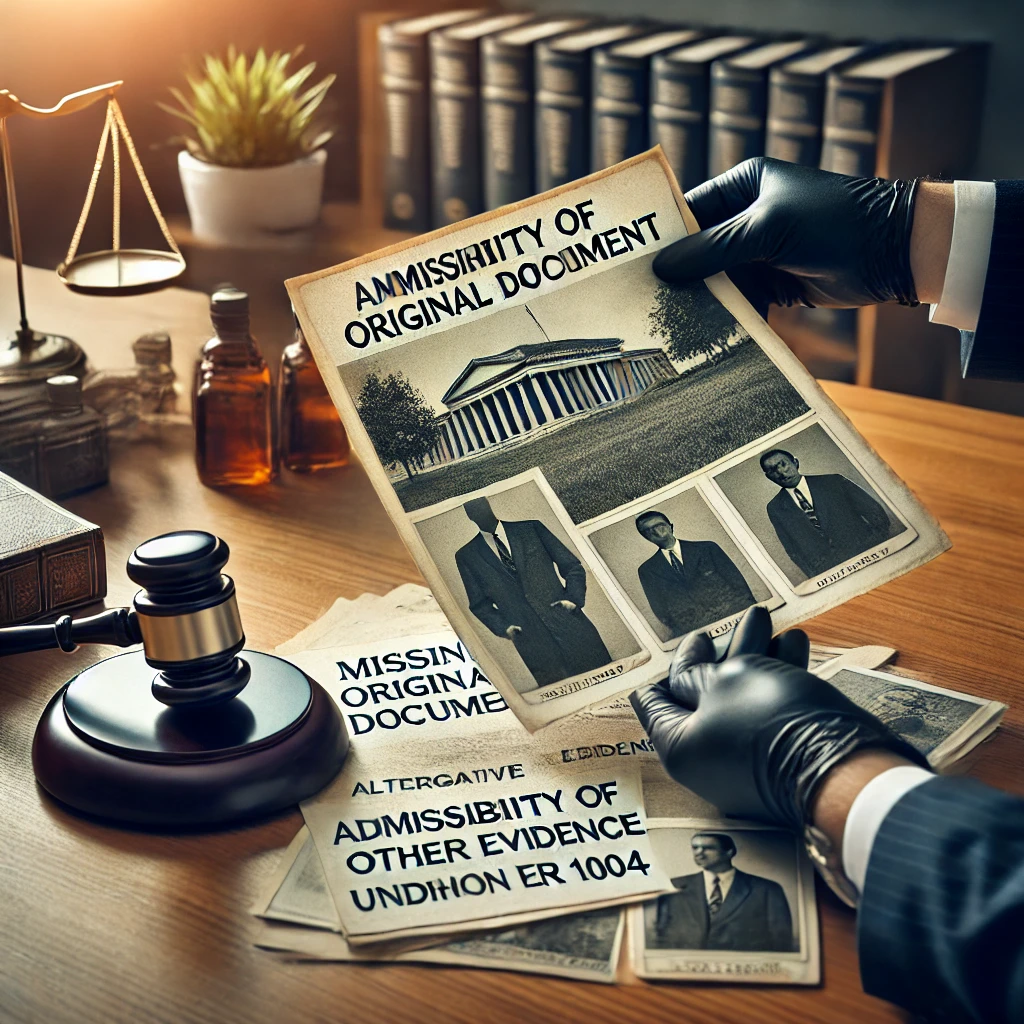When an original document is missing, Washington courts do not automatically dismiss a case. Washington ER 1004allows the admissibility of other forms of evidence when the original document cannot be produced under specific circumstances.
At Blanford Law, we help clients navigate complex evidence rules to make sure their cases move forward, even when documents are lost, destroyed, or otherwise unavailable.
View the official text of Washington ER 1004.
When Can Other Evidence Be Used Instead of an Original?
Washington ER 1004 admissibility rules permit other evidence to be introduced when:
- The original document is lost or destroyed, unless bad faith caused the loss.
- The original document is not obtainable by any available judicial process.
- The party against whom the evidence is offered had control of the original but fails to produce it.
- The matter to be proven relates to collateral issues, not critical ones.
In each of these situations, the court permits secondary evidence, such as copies, testimony, or summaries, to replace the original document.
Why Washington ER 1004 Matters in Court
Cases involving contract disputes, wills, or business transactions often hinge on documentary evidence. Without rules like Washington ER 1004, parties could unfairly avoid liability simply by losing or withholding documents.
Washington courts aim to balance fairness with flexibility, allowing parties to prove their case even without the original evidence under well-defined legal standards.
Using the right strategy to invoke ER 1004 can strengthen a plaintiff’s or defendant’s position when documents are unavailable through no fault of their own.
Key Takeaways for Admissibility of Other Evidence
- Loss or destruction must not result from bad faith to allow replacement evidence.
- Judicial unavailability of documents (even with subpoenas) can justify alternatives.
- Collateral matters do not require strict original documentation under Washington ER 1004 admissibility rules.
- Control and non-production by opposing parties opens the door to secondary proof.
Understanding these exceptions can be crucial in personal injury cases, contract disputes, business litigation, and probate matters.
Blanford Law Helps You Navigate Washington Evidence Rules
At Blanford Law, we know that lost or unavailable evidence should not prevent you from getting justice. Whether you are enforcing a contract, proving a claim, or defending against allegations, our team understands how to use Washington ER 1004 admissibility strategies to your advantage.
📧 Email: ken@blanfordlaw.com
🌐 Website: www.blanfordlaw.com
📞 Phone: 253-720-9304
Blanford Law — Guiding Clients Through Complex Evidence Rules in Washington State.

Additional Resources
Learn more about Washington evidence rules, courtroom procedures, and legal strategies with these related articles from Blanford Law:
Understanding Washington Rule of Evidence 1005: Proof of Public Records
Discover how Washington ER 1005 allows parties to prove the contents of public records without needing to produce the original documents in court.
Understanding Washington Rule of Evidence 1006: Summaries to Prove Content
Learn how Washington ER 1006 permits using summaries to simplify the presentation of large volumes of documents during legal proceedings.
Understanding Washington Rule of Evidence 1007: Testimony or Written Admissions
Explore how Washington ER 1007 allows a party’s testimony or written admissions to substitute for an original document in court.
Washington Rule of Evidence 1007
Further examine the scope and application of ER 1007 in Washington, focusing on its use in simplifying evidentiary burdens during trial.
Understanding RCW 9A.72.150: Evidence Tampering in Washington State
Learn about Washington’s law against evidence tampering, how prosecutors pursue these charges, and how evidence integrity impacts court cases.
AI-Generated Art and Copyright Protection: What You Need to Know
Discover why AI-generated content, including art, is not protected by traditional copyright laws under U.S. legal standards.
Navigating ER 408: Compromise Evidence in Washington Civil Cases
Understand how Washington ER 408 protects certain settlement discussions from being used as evidence in civil litigation.
Washington State Rules of Evidence: A Comprehensive Guide
Master Washington’s Rules of Evidence with this comprehensive guide, essential for attorneys and anyone involved in civil or criminal cases.
